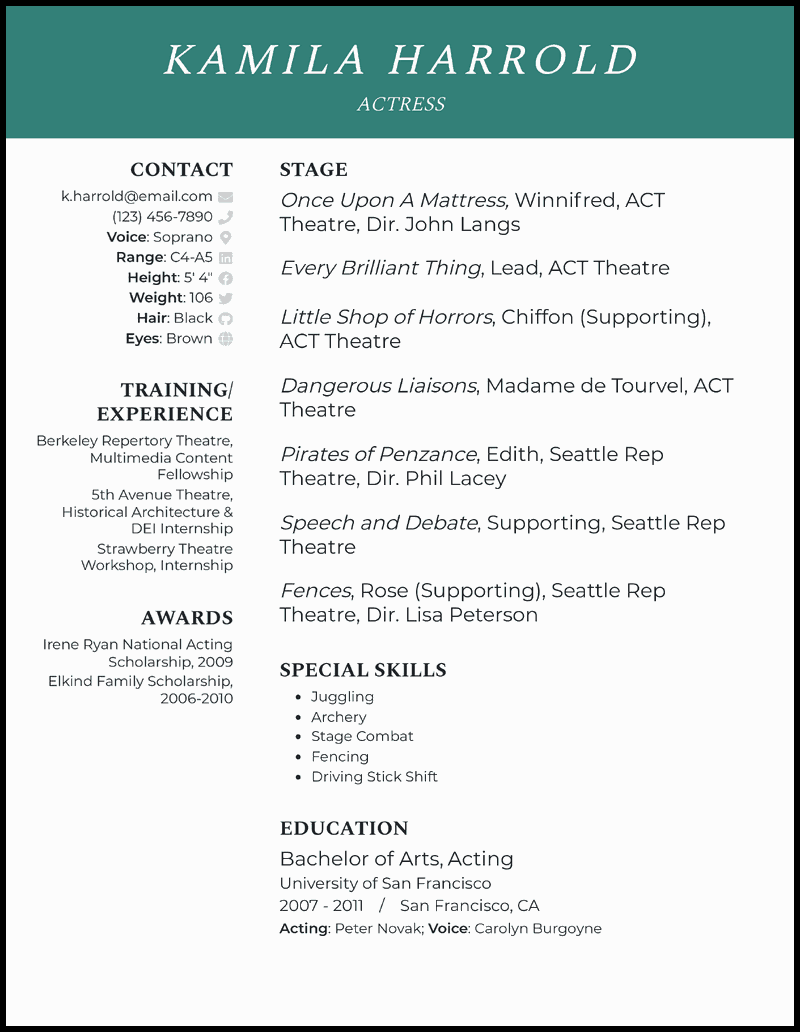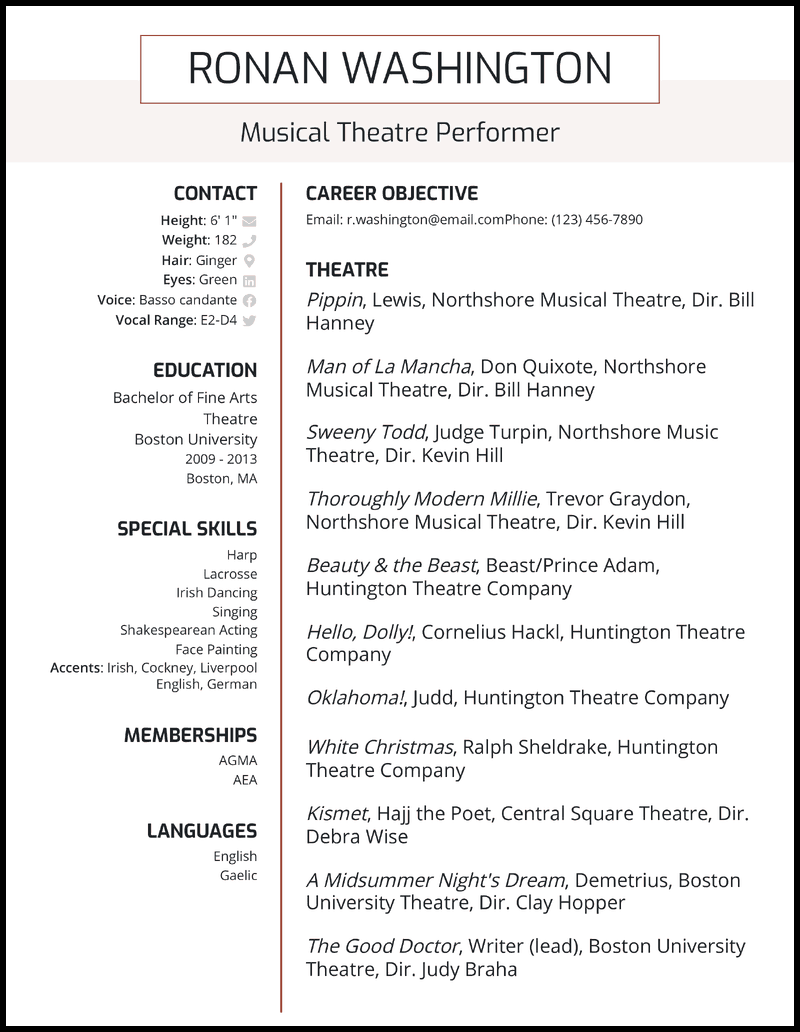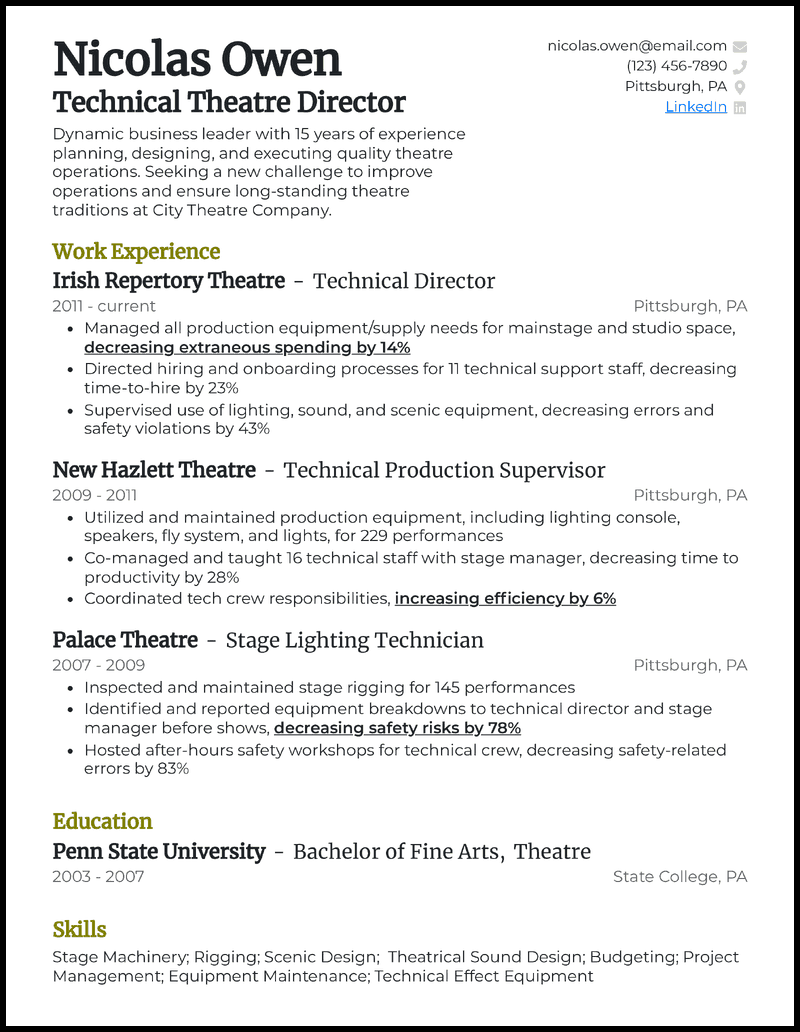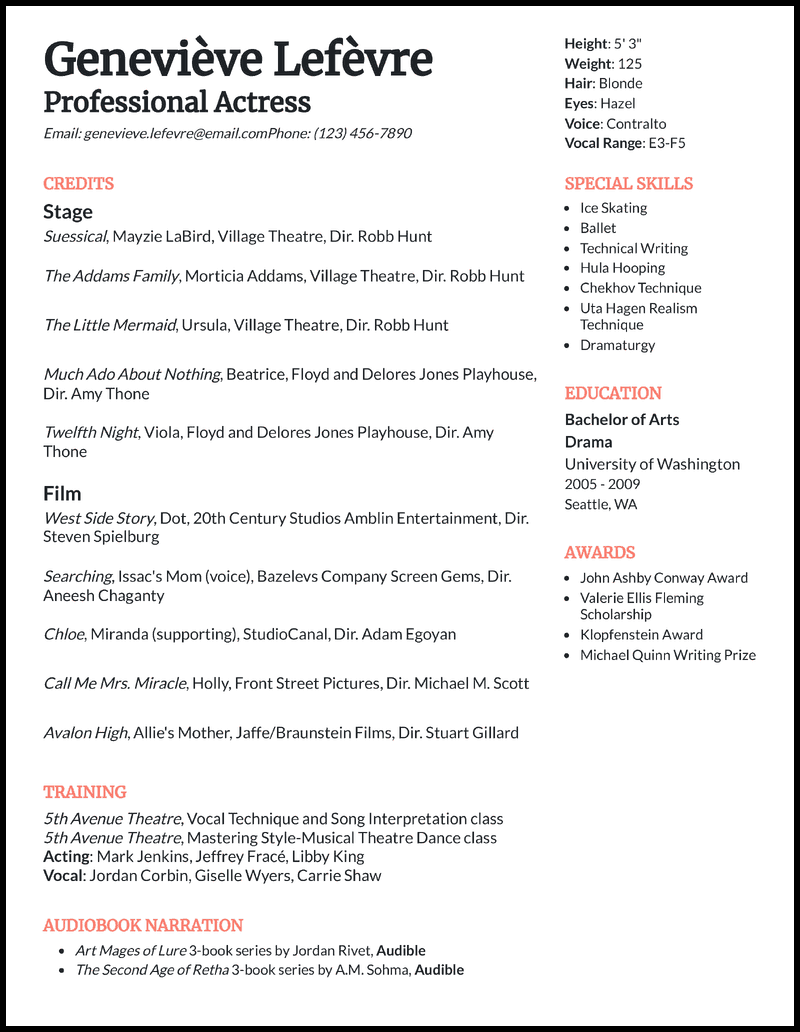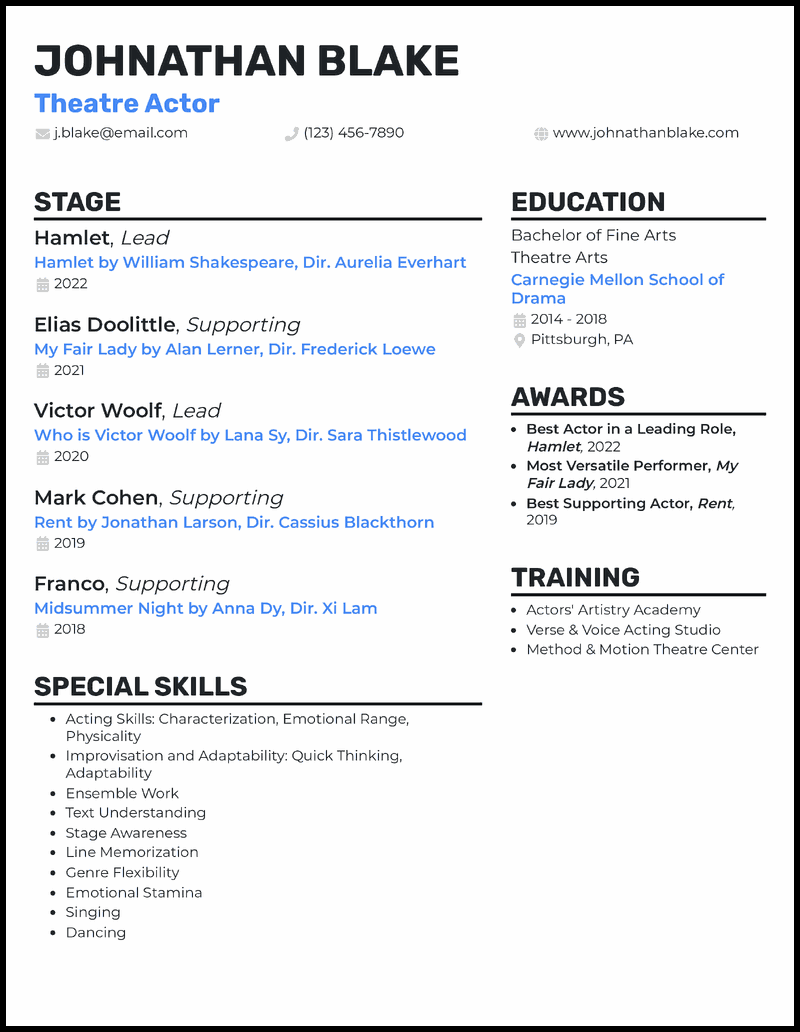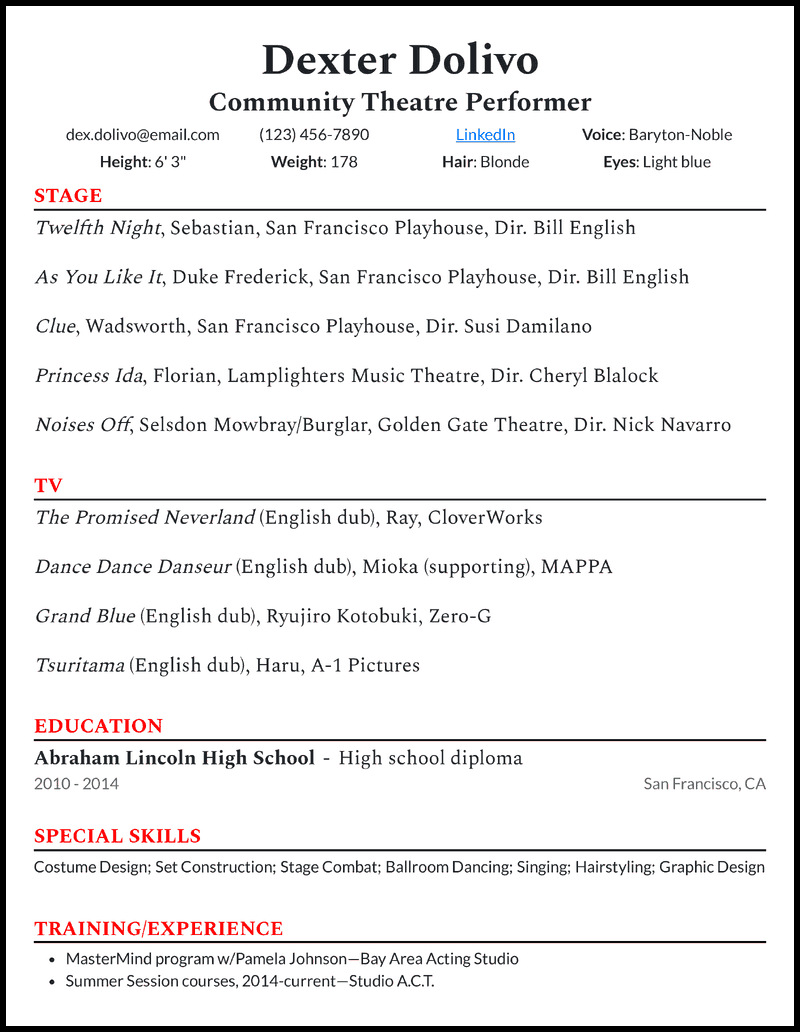Whether you want to be a community performer, work backstage with lights and sound, or make it as a professional actor, there are many ways to apply your skills and ambition to the world of theatre.
A theatre resume differs from other applications, where you emphasize your stage acts, such as work experiences. It also helps to have awards, but keep in mind that acting roles can be particular. If your resume or cover letter is not tailored to the job description, it’s challenging to stand out from the crowd. That’s why you need a polished, professional resume and a cover letter generator based on the job description to put you in the spotlight.
We’ll go over how your resume can make its way through an employer’s desk and get you hired! Stay with us and you’ll explore:
- ↪ Seven theatre resume samples
- ↪ Job-winning tips to create a stunning resume
- ↪ A complete guide on building an acting skillset
Why this resume works
- Format your resume according to theatre standards. Typical resumes use bulleted paragraphs to list work experience, but your credentials need to be in a sentence format. Make sure you include the show’s title, your role, where you performed, and the director.
Why this resume works
- Start with the skills your future director might like, and what additional certifications or qualifications you can include. You can also list any memberships you have, which can help if your director or producer recognizes your affiliation.
See more musical theatre resumes >
Why this resume works
- If you have the space, we’d recommend adding a resume summary. Use it showcase your skills and experience in two to three sentences, which is crucial in the fast-paced world of theatre.
See more technical theatre resumes >
Why this resume works
- While showcasing your past works and audience numbers are a great way to start off your theatre director resume, adding a section of special skills underscores your versatility and the overall value you’ll add to projects and the entire cast.
Why this resume works
- Start by putting your experience in reverse-chronological order. Don’t include every show or role, though; only include the credits that apply to the role you’re seeking.
Why this resume works
- List your awards (hint: best actor, most versatile performer, best-supporting actor, etc.), starting with the most recent one.
Why this resume works
- Your resume and theatre cover letter are considered the most crucial steps taken during a job search, so make sure they’re completely error-free. Get a free resume review to ensure your resume is free of any typos, grammar inconsistencies, or punctuation errors.
How to Write a Theatre Resume

At the core of your theater resume lies three things: performance experience, technical skills, and artistic training. Have a good blend of all three, and you’ll win over any employer or theatre manager. But remember, tailor your resume to the exact acting role. Therefore, showcase performance impact, specialized skills, and training in a theatre resume that captures casting directors’ attention and secures roles.
When you write your resume, consider it a direct pitch to theatre managers and producers. Showcase a side of you that will captivate audiences, and you’ll score the ticket to your dream job.
Here, we’ll cover how you can:
- Have a detailed personal and acting profile
- Use a summary or objective based on your acting experience
- Include links to similar recorded performances, depending on the acting role
- Include relevant acting classes that matter
- Make use of your accolades in acting

What should be included on a theatre resume?
The million-dollar question that strikes almost every actor/actress is what they should include in their theatre resume, and below, we’ve listed everything you must include:
- Contact Information
- Performance/Experiences
- Education & Training
- Special Skills

What makes a good theatre resume layout?
A good theatre resume design includes all your previous performances while leaving enough breathing space. You want to avoid any flashy graphics here, too. Be consistent with:
- Font
- Colors
- Spacing
- Margins
Note: There are a few things that you can be flashy with, such as italicizing the venues of plays. For example, you can write Broadway Theatre as Broadway Theatre.

Should you include headshots on a theatre resume?
Not always. Depending on the type of role you’re trying to audition for, you may never need a headshot. However, if you’re applying as a main performer or similar, a headshot (8X10 photo) attached to your physical resume can help. But don’t make the mistake of embedding it into your digital resume.

How to share contact information correctly
The casting director will want to contact you. Share the details clearly and professionally so that they can spot it at a glance.
Example
James Carter
(123) 456-7890
New York, NY
LinkedIn (If relevant)
Instagram (If relevant)
Portfolio (if you have one)

Start with a profile summary
Your profile is what casting directors will see fast. Make them want more about you by keeping it concise, punchy, and impactful.
Career objective vs. resume summary
- Career objective: Ideal for beginners or recent grads. Here, share your goals, passion, and transferable skills.
- Resume summaries are best for experienced candidates. They summarize your achievements, skills, experience, and artistic vision.
Career objective example (Entry-level)
Budding actor with strong ensemble experience from NYU Tisch productions and student-directed showcases. Eager to bring a dynamic and strong stage presence to Roundabout Theatre Company’s 2026 season. Skilled in movement, improvisation, and vocal performance.
Resume summary example (Experienced)
Versatile stage actor with 5+ years in regional and off-Broadway productions. Known for emotionally layered performances and strong comedic timing. Played lead roles in three award-winning plays, with performances drawing 5-star reviews and 28% increase in ticket sales. Committed to storytelling that captivates and challenges audiences.

Showcase impact-driven performance experience
Focus on your impactful achievements and not duties—talk about what you did, the results, review scores, and special recognitions.
See what we mean:
- Lady Macbeth – Macbeth, Shakespeare Theatre of New Jersey (2023)
- Delivered 17 sold-out performances; praised by BroadwayWorld for “commanding stage presence.”
- Stage Manager – RENT, Emerson Stage (2022)
- Managed 25+ cast and crew, ensuring zero missed cues during a 12-show run.
- Props Designer – The Crucible, Goodman Theatre, Chicago (2021)
- Created era-authentic props that were later featured in American Theatre Magazine.

How to demonstrate special skills
Whether it’s dialects, acrobatics, or backstage expertise—this section can make or break your audition invite. So, make it irresistible by packing it with in-demand skills for the role you’re applying for.
Top skills for a theatre resume:
- Stage combat (hand-to-hand, rapier)
- Dialects (British RP, Southern U.S., and Cockney)
- Singing (Mezzo-Soprano)
- Improvisation
- Dance (jazz, ballet, contemporary)
- Puppetry
- Script analysis
- Musical instruments (guitar, piano)
- American Sign Language (ASL)
- Technical theatre (soundboard, lighting rigging)
Don’t lie—skills are tested in callbacks.

How to add education and training to standout
Your theatre-themed education will add an edge to your application. Be it a degree, workshop, or masterclass, add the title here with the institution’s name, location, and graduation year.
Example
BFA Theatre Performance
Boston University College of Fine Arts
Boston, MA
2018-2022
Trained in classical theatre, voice, movement, and on-camera performance
Additional training:
Meisner Technique – HB Studio, NYC (2023)
Viewpoints Movement Intensive – SITI Company Workshop (2022).

Do awards and honors count?
Any recognition adds credibility. Mention the award name, organization, and year.
Examples:
- Irene Ryan Acting Nominee – Kennedy Center American College Theater Festival, 2022
- Best Supporting Actress – New York City Fringe Festival, 2023
- Equity Showcase Performance Mention – Backstage Magazine, 2024

Are there other sections to add (Optional)?
Depending on your career path, these extra sections can add more weight to your resume:
- Union Memberships: e.g., AEA, SAG-AFTRA (if applicable)
- Languages: Great for multilingual productions
- Reels or Portfolio Links: Include if you have recorded performances
- Volunteer Work: Teaching, community theatre, outreach
- Technical Credits: For hybrid actor/tech roles

Key takeaways
- Emphasize your past theatre performances
- Be consistent with your fonts and colors
- Include awards that you’ve received for similar acting roles
- Use the right format
- No room for errors
Theatre Resume FAQs

It’s brief about your acting or production experience, skills, education, and training relevant to the role you’re applying for. It should be concise, results-driven, and compelling enough to make casting directors or producers want you in their projects.
A solid theatre resume should include the following:
✅Contact information
✅A profile summary or career objective
✅Theatre experience (roles, companies, years)
✅Education and training
✅Special skills
✅Awards or honors
✅Optional extras include unions, languages, or social media links.
List your performances, acts, and projects in reverse chronological order. For each experience, include your role, the play’s name, the theatre/company, the city, and the year. Follow with several bullet points showing your achievements. Focus on impact—sold-out shows, top reviews, leadership during production, or skills used under high-pressure situations.
Aim for a one-page theatre resume to get maximum attention from employers. It’s the best middle ground to not be too long or too short to present your details and past performances.




![7 Theatre Resume Examples [& Templates]](https://beamjobs.wpenginepowered.com/wp-content/uploads/2024/01/theatre-resume.png)
